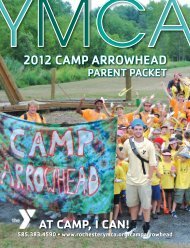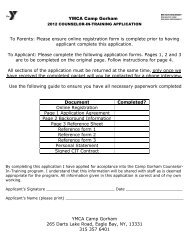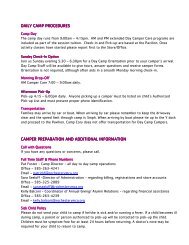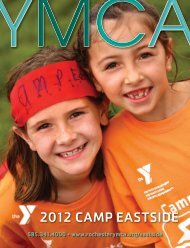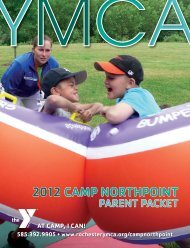2012 Conference Executive Record Report.pdf - YMCA of Greater ...
2012 Conference Executive Record Report.pdf - YMCA of Greater ...
2012 Conference Executive Record Report.pdf - YMCA of Greater ...
You also want an ePaper? Increase the reach of your titles
YUMPU automatically turns print PDFs into web optimized ePapers that Google loves.
Chief Justice Decision<br />
Atrion Raimundi, Appellant, v. Child<br />
Protective Services and Mike Couzens,<br />
individually, Respondent.<br />
Supreme Court, Appellate Division, Third<br />
Department, New York<br />
March 9, <strong>2012</strong>, Argued<br />
March 10, <strong>2012</strong>, Decided<br />
COUNSEL: Eric Quitter and Stephen Bruno,<br />
for Appellant.<br />
Tara Galusha and Joanna Bugenis, for<br />
Respondent.<br />
JUDGES: Last, Last, Last, and Last.<br />
OPINION BY: Last<br />
OPINION<br />
We the Appellate Court <strong>of</strong> the State <strong>of</strong> New<br />
York rule part in favor <strong>of</strong> the respondent, Child<br />
Protective Services and Mike Couzens, and part<br />
in favor <strong>of</strong> the Appellant, Atrion Raimundi.<br />
The Constitution <strong>of</strong> the United States protects<br />
the most sacred rights <strong>of</strong> our citizens, and the<br />
two amendments at issue in this case are the 4th<br />
amendment, which protects against unreasonable<br />
seizures, and the 14th amendment, which<br />
protects our right to familial association. First,<br />
this court does not find that there was a violation<br />
<strong>of</strong> the 4th amendment. The Attorney General<br />
was able to successfully convince the court that<br />
Couzens acted appropriately under the<br />
circumstances. Under the 4th amendment, CPS<br />
can only seize a child if one other sign <strong>of</strong> abuse<br />
is coupled with the violation <strong>of</strong> smoking with a<br />
minor in a motor vehicle. The Attorney General<br />
adequately showed that this abuse existed, thus<br />
constituting a 4th amendment violation. In our<br />
case, however, several factors made it clear that<br />
possible abuse in an emergency situation<br />
existed. Couzens used both his knowledge from<br />
Molly Warren, who is a trained police <strong>of</strong>ficer,<br />
his abilities as a trained CPS worked to<br />
determine when abuse is taking place, and the<br />
scene he witnessed, which included Joe crying<br />
and screaming in the snow as Atrion acted<br />
indifferent and eventually forcefully grabbed the<br />
child. Considering the totality <strong>of</strong> the events, we<br />
believe that an emergency situation did exist and<br />
that it was in the best interest <strong>of</strong> the child for Joe<br />
to be taken into the custody <strong>of</strong> CPS. Because <strong>of</strong><br />
this, the 4th amendment was not violated.<br />
In regards to the 14th amendment, we find that<br />
CPS violated Atrion’s fundamental right to<br />
familial association. This violation existed due<br />
to the fact that the separation was shocking,<br />
arbitrary, and capricious. Just as there was a<br />
threshold <strong>of</strong> time when the children should have<br />
been returned in the case <strong>of</strong> Perez v. Sugarman,<br />
the Public Defender sufficiently demonstrated<br />
that such a threshold exists in our case. Prior to<br />
when physical abuse was <strong>of</strong>ficially ruled out, we<br />
find that the holding <strong>of</strong> Joe was not shocking,<br />
arbitrary, and capricious. Since the possible<br />
threat <strong>of</strong> physical abuse still existed, the 14th<br />
amendment was not violated. However, we find<br />
that this threshold was surpassed once Atrion<br />
was denied visitation to his son after the<br />
physical abuse had been disproven. According to<br />
Anthony v. New York, a main reason a 14th<br />
amendment violation was not found was because<br />
contact was given to the family. In our case,<br />
however, no such contact was granted, thus<br />
justifying the 14th amendment violation. Since<br />
there was no further threat <strong>of</strong> abuse we find that<br />
withholding Joe from Atrion’s custody was<br />
shocking, arbitrary, and capricious, thus<br />
constituting a 14th amendment violation. The<br />
14th amendment protects the rights <strong>of</strong> familial<br />
association. Being as this is a part <strong>of</strong> the<br />
constitution and thus a fundamental right, we the<br />
court feel that protecting this right is <strong>of</strong> upmost<br />
importance.<br />
Even though we find no violation <strong>of</strong> the 4th<br />
amendment, the violation <strong>of</strong> the 14th<br />
amendment provides justification that a new trial<br />
should be granted.<br />
41





